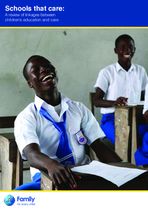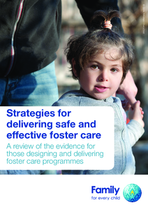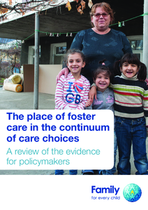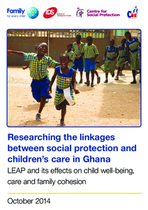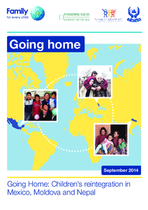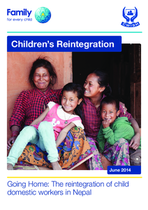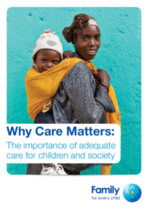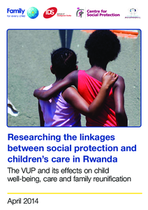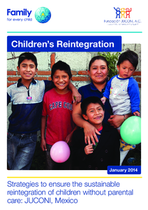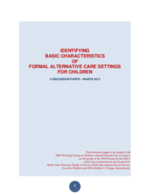Family for Every Child is a global network of local and national civil society organisations working together to improve the lives of vulnerable children around the world and supporting children to grow up in caring families, safe from exploitation and abuse.
Members include:
- KoRoot (South Korea)
- Zefie (Germany)
- Legal Services for Children (USA)
- 100% Mamans (Morocco)
- Children Assistance Program (CAP) (Liberia)
- Mulberry Bush (UK)
- Enfoque Niñez (Paraguay)
- Paicabi (Chile)
- Voice of Children (Nepal)
- Center for the Prevention and Treatment of Child Sexual Abuse (CPTCSA) (Philippines)
- CONACMI (Guatemala)
- Community Based Rehabilitation Jamaica (Jamaica)
- First Step Cambodia (FSC) (Cambodia)
- Hayat Sende Derneği (Turkey)
- Naba’a (Lebanon)
- Undugu Society of Kenya (USK) (Kenya)
- Children in Distress Network (CINDI) (South Africa)
- Jordan River Foundation (Jordan)
- Taller de Vida (Colombia)
- ChildLink (Guyana)
- Forum on Sustainable Child Empowerment (FSCE) (Ethiopia)
- Challenging Heights (Ghana)
- Uyisenga Ni Imanzi (Rwanda)
- Projeto Legal (Brazil)
- Partnership for Every Child (P4EC) Russia (Russia)
- Hope Village Society (Egypt)
- Muhammadiyah (Indonesia)
- Butterflies (India)
- Associação Brasileira Terra dos Homens (ABTH) (Brazil)
- JUCONI (Mexico)
- Semya Kazhdomu Rebenku (Kyrgyzstan)
- Farm Orphan Support Trust (FOST) (Zimbabwe)
Where they operate
Organization Type
Main Areas of Work
What They Do
Family for Every Child supports hundreds of thousands of children and families around the world by taking locally-led action in our communities. Underpinned by our experience of working on the front line, we also develop research, exchange practice, help in crises, and campaign for rights around the world.
Organization Resources
This report presents the key findings of a scoping study on the links between education and children’s care. The study involved a literature review in English, French and Spanish; key informant interviews; and consultations with 170 children, carers, teachers and other stakeholders in Guyana, India, Russia and Rwanda.
This report from Family for Every Child begins to fill the gap in understanding on how to deliver effective, safe foster care programmes through an exploration of the literature and interviews with experts.
This report from Family for Every Child explores rising concerns about the expansion of foster care services in low and middle income countries, it begins to fill the gap in understanding, and aims to assist in both states’ and NGOs’ decisions on whether to invest in foster care, and in the kinds of supportive services needed to make foster care safe and effective.
This report was written by Keetie Roelen and Helen Karki Chettri from the Centre for Social Protection (CSP) at the Institute of Development Studies (IDS), with inputs and support from Family for Every Child and Challenging Heights, Ghana. The report investigates the links between child wellbeing, children’s care, family cohesion and the Livelihood Empowerment Against Poverty Programme (LEAP), a national social protection scheme in Ghana which aims to reduce extreme poverty in the country and is centred on providing cash transfers to the most vulnerable.
This report from Family for Every Child and partners summarises research on children’s reintegration that took place in Mexico, Moldova and Nepal from 2011 to 2014.
This report documents a study of the reintegration of child domestic workers in Nepal.
This report highlights the needs of children without adequate family care, the impact inadequate care on children and society, and why family care is important. In this report, Family for Every Child also issues several recommendations for those in all sectors of society and an example of care reform from Brazil.
This report features the results of, and recommendations based on, a study conducted in Rwanda which investigates the links between the cash transfer program “Vision 2020 Umurenge Programme (VUP),” child well-being, and children’s care and family reunification.
This paper reports on the Mexican arm of Family for Every Child’s three-country study on strategies to ensure the sustainable reintegration of children without parental care.
The discussion paper provides an overview of existing definitions of formal care within the UN Guidelines and a summary of the basic characteristics identified for each, together with explanations for the proposed characteristics.


